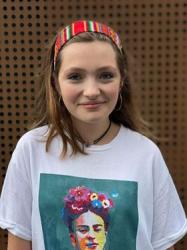Some Reykjavik residents wish they could emulate Lizzo; others dream of skydiving or travelling to space. Yet more merely hanker after a dozen parakeets and a bunch of grapes. Or at least that’s what the Reykjavik City Library’s collaborative collage “I Wish I Could” suggests. Throughout July, visitors are invited to “leave a little piece of [their] minds” by adding their own magazine clipping to a huge portrait.
The collage is part of a wider initiative titled ‘Beyond Words’ that aims to use art to foster multiculturalism, explains Martyna Karolina Daniel, project organiser and the library’s specialist in intercultural affairs.

I Wish I Could – Photo by Martyna Karolina Daniel
“We don’t want certain groups or languages or certain nationalities to feel like they’re being left out” Martyna tells us. Linguistic barriers often make holding diverse events more difficult—Icelandic language workshops draw Icelanders and English-language events foreigners, so on arrival in her new position three months ago, Martyna embarked on a mission to set aside linguistic differences and bring the two groups together. The solution? Art.
In addition to the current collaborative piece, Martyna is organising a series of free workshops hosted in the library, where members of marginalised racial groups are given the chance to express their identities by creating their own collage portraits, ready for display in Autumn. More than 40 people have participated so far, representing 15 different nationalities, but the goal is 100 art works.
Diverse thinking
“I’ve decided to focus on portraits and to showcase diversity differently,” Martyna explains. “Often when we think of diversity we think of how different we look or the different languages we speak. Even if it’s in a very positive way, we’re still focusing on outside things and here in this workshop I want people to just dig deep in their heads: What do they wish for? What do they wish they could change? What do they wish they could be?”
“It’s a very easy workshop for anybody to do,” Martyna explains. “Some people like to chat round the collages and some people like to be silent and just look through the images.” Both approaches are entirely valid, Martyna stresses. “If they feel comfortable enough sharing why they created their portraits they can, but I never ask. I know exactly what some portraits mean because their creators felt comfortable enough to share their thoughts and others are a complete mystery to me and I like that. There is no right and wrong way to do it—it’s just interesting to see how differently we all think.”

Beyond Words – Photo by Martyna Karolina Daniel
One of the ‘Beyond Words’ portraits Martyna has an explanation for depicts the challenges faced by a recent immigrant to Iceland. “The person who did this used to be a math teacher in their country of origin and then when they arrived in Iceland, they had to open up their mind to other things because they could no longer be a math teacher here because they do not speak Icelandic. It was a big struggle and is still something that is very difficult for that person, letting go of a past career. They are now learning other skills, for example baking, so they can make a future for themselves here, a new start and hopefully their family can come too.” And the background for the collage? A map of Iceland from last month’s issue of the Grapevine.
Inclusivity is the name of the game
So far, Martyna has been focusing her efforts on running workshops for minority groups including refugees and asylum seekers. “We want to reach out marginalised groups to bring them into the library so they can make the space their own.” Martyna explains that in place of the standard guided tour around the building, she “wanted to introduce them to the space through an activity. You do a workshop and drink some coffee here, and maybe next week when you stop by you’ll feel like it’s a little bit more your space than it was a week ago.”
Martyna and her colleagues are committed to making the city’s libraries a safe haven for all Icelanders, whether native or immigrant and a place where cross-cultural dialogue can take place. “They’re a public space first and foremost so they’re meant to reflect the diversity [of Iceland]” she says. “It’s a very strong focus point for the city libraries to be open for anybody, not just to step in, but for everybody to feel that they belong here and for everybody to feel that they can be an active participant.”
Alongside art workshops the library aims to live up to this inclusive ethos by offering a wide range of foreign-language books and using more symbols in its signage to combat linguistic differences. Its autumn brochure will also bear a new slogan: “opin rými allra” (open space for all).
That’s the bottom line Martyna stresses: the City Library is “a space for everybody”.
‘I Wish I Could’ will be on display on the ground floor of Borgarbókasafnið throughout July, all visitors are encouraged to add their own magazine clippings. Keep your eyes peeled for more developments in the Beyond Words art project this Autumn via the Library’s website. Martyna will be opening the portrait workshops up to everyone later in the year.
Note: Due to the effect the Coronavirus is having on tourism in Iceland, it’s become increasingly difficult for the Grapevine to survive. If you enjoy our content and want to help the Grapevine’s journalists do things like eat and pay rent, please consider joining our High Five Club.
You can also check out our shop, loaded with books, apparel and other cool merch, that you can buy and have delivered right to your door.
Buy subscriptions, t-shirts and more from our shop right here!
















